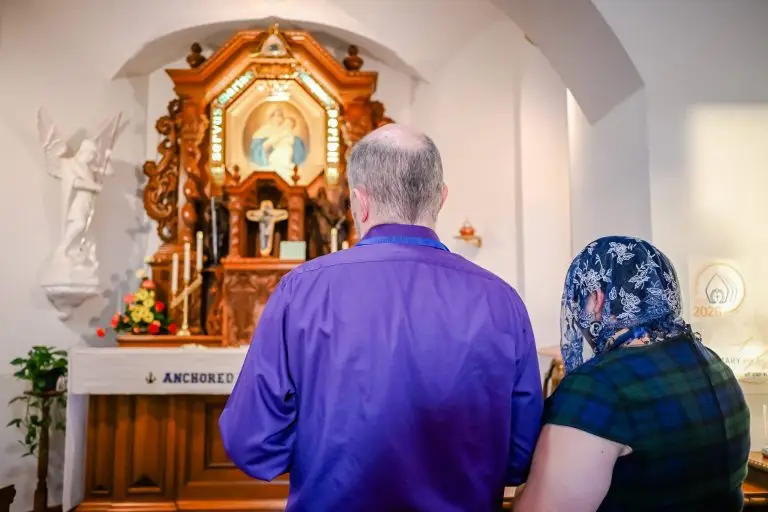Back in the third century AD, the Roman emperor Claudius II forbade his soldiers from marrying Christian women. In addition to his opposition to Christianity, the ruler was convinced that single and “untethered” men made the best soldiers.
Moved by the pain caused by this unjust decree, a Catholic priest named Valentine defied the empire by secretly marrying couples in love. His behavior earned him imprisonment and martyrdom, as he was executed on February 14, 270. After numerous miracles and healings, he was canonized by Pope Gelasius in 496. Since then, Saint Valentine has been venerated all over the world as the protector of lovers.
Like the era of that ruthless Roman emperor, postmodernity does not seem to be a favorable time for love. Much less for marriage. We live in a rather disenchanted, relativist and utilitarian world. Lifelong loves seem to succumb to less ambitious relationships. Some years ago the Polish philosopher Zygmunt Bauman coined the expression “liquid love” in reference to a certain tendency towards fugacity, towards weak commitments and ties that falter in the face of the overwhelming individualism of the age.
And yet… love is stronger
The meeting of two people who choose to unite their bodies, their souls and their life projects is one of the images that best reflects the essence of divine love. The figure of the betrothal is the one that St. Paul himself chooses to describe the relationship of Christ with his Church. St. Paul proclaims a love which he defines as the bond of perfection. And, although when it comes to relationships, recipes are not usually very useful, the Pauline letters provide us with a perfect manual for lovers.
Love is nourished by patience, by generosity, by wanting the best for the beloved. Love is not possessive, although it does give a sense of belonging. Love is, in the words of Father Kentenich, being with the other, in the other and for the other.
The initial spark is just the foundation on which the intimacy of two people is built. A process that often requires stretching the heart and opening the mind to understand and treasure that sacred mystery which is the other person. That is why, in addition to feeling, love requires decision. To love is a verb, an action. If anything is inconsistent with love, it is the passivity of waiting for harmony to fall from the sky, ready to be used. To love is an exercise that involves us completely. Hence the importance of our willingness to make the magnanimous gift of our personal selves.
God does not abandon the work of his hands. The miracle of love is not extinguished. In the midst of the postmodern crisis, as was the case in imperial Rome, bodies and souls meet and give themselves without reservation, seeking fulfilment. However, the outlook is not easy for today’s couples who are immersed in cultural patterns that are often at odds with love.
Love and marriage: fragility and hope
The truth is that the bond of love is as strong as it is delicate. Hand in hand with the happiness of sharing one’s life with a loved one, difficulties arise and demands are made that complicate the couple’s path. These vital processes of living together generate tensions that can even lead to separation.
In his apostolic exhortation Amoris laetitia Pope Francis approaches with mercy the situation of those who have suffered the pain of separation and divorce. While the document makes it clear that the sacramental union between free men and women is the way of life proposed by the Gospel, it also understands that this is an ideal that is subject to the frailty of human beings. And, in the face of human frailty, the evangelical response is mercy. In this context, Francis emphasizes as a sign of hope the decision of those who, after experiencing the heartbreak of a separation, try again to build a family.
Perhaps the most painful divorce is that of love and marriage, the rift which can be traced back a few decades. Just when it seemed that humanity had conquered forever the joy of marrying for love. It is out of fear of a loveless marriage (and its devastating consequences) that many choose to live love without marriage. And few choose to marry in the Church.
“So that conjugal love does not become the tomb of true love, spouses must train themselves in love. May marriage be a school of love. In every school there are different levels of learning, and so too in the school of love. May the initial primitivism of mutual love be transformed, with the passage of time, into a mature, serene and selfless love. The key is to provide channels for the stream of divine love to pass through our conjugal love.
(Fr. Joseph Kentenich. Monday Afternoon. Meetings with Families: Conjugal Love, Path to Sanctity. Volume 20)
Love between a couple is a precious gift from God and the sacrament of marriage is the way to make it grow and mature. Clearly, this is the moment for those of us who believe in this to bear witness to it with our lives and to proclaim it with joy in our hearts.
Like Saint Valentine, we too can challenge the emperor.
Source: schoenstatt.org.ar
Translation: Maribel Acaron



